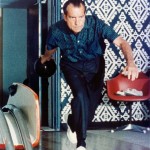The Most Dangerous Man in America: Daniel Ellsberg and the Pentagon Papers
 For my tenth birthday, my mother got me a framed copy of the front page of the New York Times from the day I was born. The big headline is about food costs pushing up the price index; other above-the-fold news included items about a summer-job initiative backed by Nixon, testimony on a fund alleged to have sponsored foment in Chile, and the conclusion of the siege of Rach Bap in Vietnam.
For my tenth birthday, my mother got me a framed copy of the front page of the New York Times from the day I was born. The big headline is about food costs pushing up the price index; other above-the-fold news included items about a summer-job initiative backed by Nixon, testimony on a fund alleged to have sponsored foment in Chile, and the conclusion of the siege of Rach Bap in Vietnam.
None of these resonates much today, not compared with two headlines below the fold: “Court Quashes Subpoenas on Watergate Reporting” (Nixon’s team tried and failed to get reporters to turn over unpublished material), and “Ellsberg Backed On Access To Data” (the government did not own the copy of the Pentagon report that Ellsberg copied).
Even as a kid, I knew that the Ellsberg and Watergate headlines were the lasting news, but despite having that front page hanging in every bedroom I’ve lived in since 1983, I never learned the specifics of Ellsberg’s case until watching the documentary, and it’s quite amazing. The movie gilds the lily a bit with the tensely shot re-enactments and the Mission: Impossible-esque score, but it doesn’t change the essential fact: that this one guy, after trying and failing to make the best of a bad job vis-Ã -vis the Vietnam “conflict,” finally decided that no ethical option remained except to rat out five administrations for their cynical actions in Southeast Asia. And he assumed he would go to jail for it, but he felt he had no choice.
What’s striking about Ellsberg’s stand is not just its courage; it’s that subsequent administrations have learned nothing from Nixon’s paranoid bungling of the consequences. And most striking of all, as always, is that Nixon is, in the end, such a pathetic asshole. The American people had little way of knowing the extent of it then, of course, but he and Kissinger have a conversation in which Nixon expresses the desire to hurry the entire Vietnam process up by dropping a nuclear bomb on “that shit-ass little country” and having done with it, and Kissinger naysays it — because it would be a PR problem. I understand that the conversation was not meant for public consumption, but even in a private meeting — this is what you say? This is who you are? The equivalent of “Nuke ’em all and let God sort ’em out,” followed by “You can’t do that, sir, it looks bad”? Not that I don’t still wonder how this country went back for a second helping of W., but…ain’t nothing new under the sun. Sadly.
It’s an interesting movie, easy to follow, doesn’t try to do too much. I appreciated the footage of present-day Ellsberg continuing to lie down in front of police vans at war protests and let himself get arrested; it’s not easy to live one’s beliefs all the time, but it’s nice to see that it’s worthwhile on occasion.
Sarah 47, Death Race 11; 14 of 24 categories completed
Tags: Daniel Ellsberg Henry Kissinger movies Oscars 2010 Death Race Richard Nixon






Man, I’ll have to track down this doco, but I’m also thinking about what a cool present that was.
I’ve kept the papers from the day my daughter was born, so maybe I should do that for her 10th birthday. Although if memory serves, Nicole Kidman was on at least one front page, which is lame.
I’m sure by then, my daughter will be all “what the hell’s a newspaper?”
“it’s that subsequent administrations have learned nothing from Nixon’s paranoid bungling of the consequences.”
The only thing they appear to have learned is to strangle the press as much as possible. It’s at times like this that the chapter on the media in “America the Book” seems like the most accurate critique of the power relationship between the government and the press ever written.
Reading “The Best and the Brightest” was as depressing as I imagine watching this doc to be (I still intend to see it, though).
Ellsberg’s memoirs are fascinating as well.
Another good Nixony read is Pearlman’s Nixonland. Eye-opening, and sheds quite a bit of light on Cheney/Palin (also too).